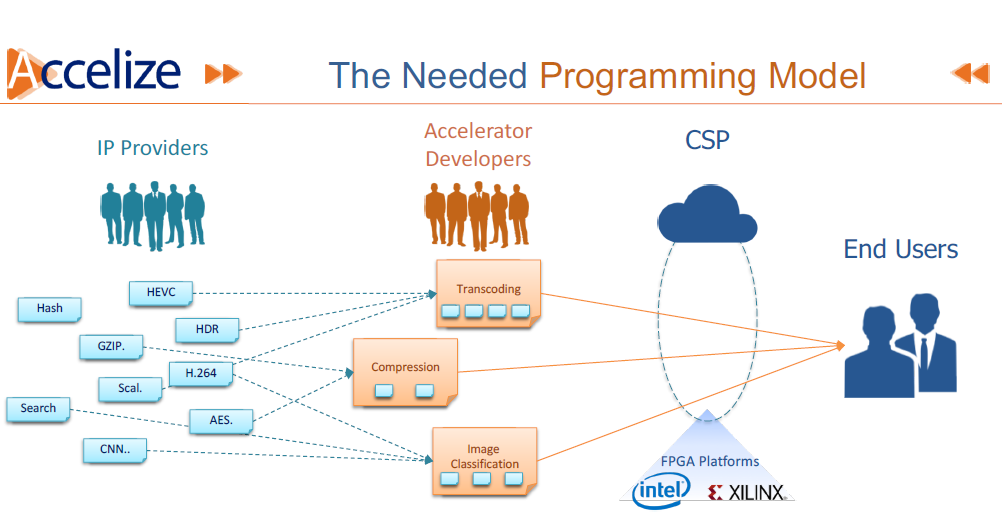Intel to Battle in FPGA-as-a-Service Race
Article By : Junko Yoshida, EE Times

The cloud service is changing practically everyone's business. As FPGA Acceleration-as-a-Service starts to emerge, Intel has just partnered with Accelize so that they can help cloud service providers like Amazon or Alibaba increase "compute instances with FPGAs."
MADISON, Wis. — The cloud service is changing practically everyone’s business.
Often, it forces hardware vendors’ hands, and nudges them to offer their products — at drastically reduced rates — “as a service,” rather than selling customers the hardware as a tangible product.
Car-as-a-service (“CaaS”) is one example. The concept of “miles used per vehicle” fundamentally alters carmakers’ “unit-based sales” model. It represents both a threat and an opportunity that the automotive industry can no longer afford to ignore.
The chip business could be next. “FPGA as a service” is emerging as a cloud application in data centers. If it starts to take off, how will FPGA vendors like Intel or Xilix respond?
Just last week, Intel announced that its FPGAs are powering the Acceleration-as-a-Service of Alibaba Cloud, the cloud computing arm of Alibaba Group.
Meanwhile, Accelize, a spinoff of the PLDA Group, banking on the “as-a-service” business model, has developed solutions for FPGA-acceleration-as-a-service in the cloud. The idea is to help cloud service providers like Amazon or Alibaba increase “compute instances with FPGAs,” offering users custom hardware acceleration for their applications.
Accelize, based in Aix-en-Provence, France, unveiled Tuesday (Oct. 17) a collaboration with Intel to make FPGA programming more accessible to mainstream developers. The companies hope to empower customers interested in “pay-per-use” of FPGAs in data centers but don’t have enough FPGA programming expertise.
Specifically, Accelize said Intel’s Acceleration Stack for Intel Xeon CPU with FPGAs and its Programmable Acceleration Card (Intel PAC) — with Intel Arria 10 GX FPGA— will integrate into the Accelize solution. The result, the companies say, will be an easy-to-use experience with Intel FPGAs in the enterprise or the cloud for development of FPGA accelerator functions.
Industry analysts see the FPGA-as-a-service still in its early days of market development among cloud service providers such as Amazon, Alibaba, Baidu and Microsoft who own their own hyperscale data centers. Intel is reportedly trying to catch up with Xilinx.
Mismatches
During the interview with EE Times, Stéphane Monboisset, director of marketing and partnerships at Accelize, discussed mismatches he sees between current cloud service offerings today and what users really want. Cloud service providers may provide FPGA as a service in their data centers, but what users need is “acceleration as a service,” he noted.
Let’s face it. FPGAs are not exactly known for programming ease. Users know the applications in their own domains, but they don’t have FPGA expertise. Where can users go for help, to find developers who know about acceleration?
Further, in order to implement FPGA acceleration in the cloud, users need not one but a plethora of IPs, which Monboisset described as “building blocks for designs” — necessary to do specific functions. Such IPs include HEVC, HDR, AES, CNN and more. How and where do cloud service providers obtain such IPs for FPGA acceleration in the cloud? Monboisset sees IP procurement a big issue.
And that’s not all. Assuming that acceleration developers will do FPGA programming, they might find a few of the IPs they need. Still looming large is the question of how they can collect a full array of IPs.
The IP business model, put simply, is “not compatible with the cloud business model,” explained Monboisset. IP providers prefer a traditional one-time cost model that provides a huge chunk of money upfront. In contrast, the cloud business is built on a pay-per-use, per-hour model.
Next page: FPGA-as-a-Service market size

